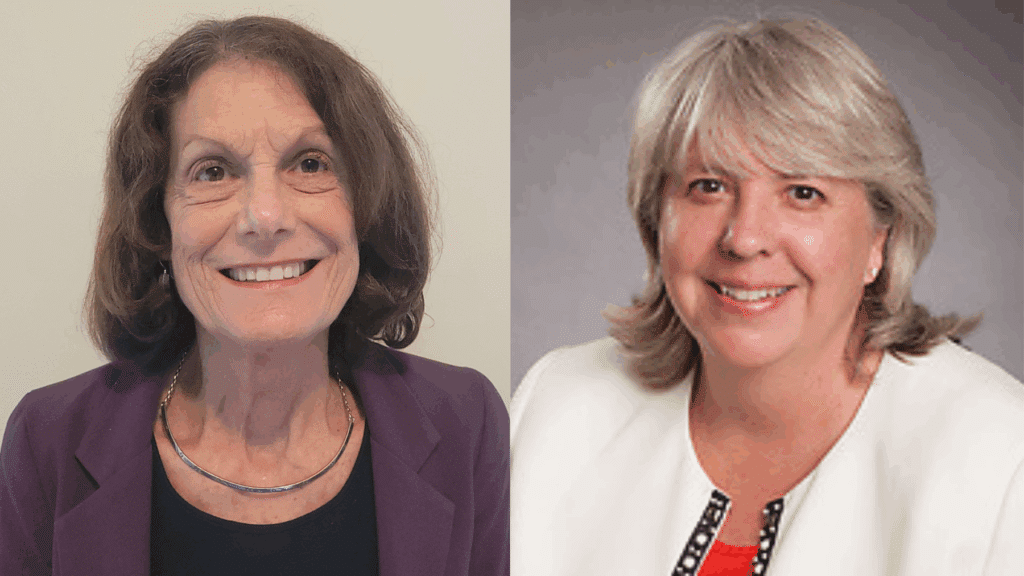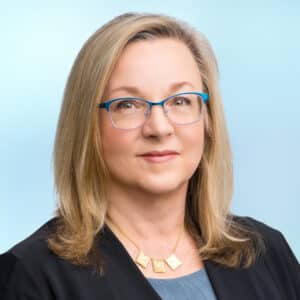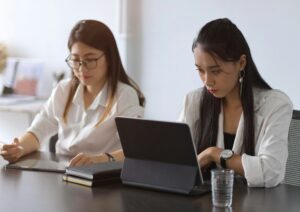Volunteer Spotlight: Nancy Lopez & Elizabeth Symonds

In this Volunteer Spotlight, we introduce you to Nancy Lopez and Elizabeth Symonds. Nancy and Liz first met at the Washington Council of Lawyers, a public interest bar association, kicking off a years-long partnership. Today, they serve as co-counsel on domestic violence cases for Volunteer Legal Advocates in Montgomery County, MD, and Washington, DC, combining decades of experience and a shared commitment to helping survivors navigate the legal system.
We spoke with Nancy and Liz to learn what keeps them returning to Volunteer Legal Advocates cases, and why they believe any lawyer can make a difference.
How did you first meet and begin your partnership?
Nancy: We were involved with the Washington Council of Lawyers, the pro bono public interest bar association for D.C. Liz was a longtime board member, and I became their Executive Director. We worked together on policy matters—Liz co-chaired our Advocacy Committee. When I retired, I wanted to get back into the courtroom, and Liz did too. It was a natural collaboration.
Liz: Our working relationship transferred seamlessly to our domestic violence cases. We already knew we worked in similar ways, which made it a joy. Funny enough, we’ve never worked in the same office, just side-by-side on cases. So far, we’ve always taken cases together, though I do volunteer at legal clinics solo. Nancy speaks Spanish and I speak French, so we joke that maybe one day we’ll each take the “right language” case on our own.
Tell us about your professional backgrounds and how you came to legal volunteer work.
Liz: I went to law school intending to be a public interest lawyer. After a fellowship at Georgetown’s public interest clinic, I joined the ACLU in D.C., then the national ACLU office, doing legislative work on women’s and children’s rights. I later spent almost 25 years in the federal government. I oversaw our pro bono program there, connecting me to domestic violence volunteer opportunities and Volunteer Legal Advocates (then DCVLP). As a federal lawyer, I did pro bono walk-in clinics and some family law work. These experiences laid the groundwork for what I do now.
Nancy: At Georgetown Law, I did a lot of clinic work and represented clients in landlord-tenant cases. At Steptoe & Johnson, I continued a pro bono practice and then served as a loaned associate to the Legal Aid Society of D.C., where I handled domestic violence, family law, public benefits, and landlord-tenant cases. I loved it and eventually joined Legal Aid full-time. Then, after eight years at home with my kids, I became Executive Director of the Washington Council of Lawyers, which kept me in legal services even though I wasn’t in the courtroom. When I retired, volunteering with Volunteer Legal Advocates (then DCVLP) was a perfect way back.
How did you first connect with Volunteer Legal Advocates?
Nancy: When the founders of what became DCVLP and then Volunteer Legal Advocates first started out, they began by meeting with legal services organizations and people interested in supporting their work. On a snowy day, I drove up a steep hill to attend one of their early organizing meetings. I thought their model was fantastic and followed their growth over the years. When I retired, I was thrilled to finally volunteer.
Liz: I have known about Volunteer Legal Advocates for years and always intended to get involved. The mission was compelling, but equally important was the extraordinary support volunteers receive, especially non-litigators like me. Knowing that an experienced staff attorney (and Nancy!) would be right there made me confident I could do the work.
Is there a particular case or moment that stands out?
Liz: In Maryland, Nancy and I represented a very young client whose boyfriend had pulled a gun on her and her friends. She was still traumatized, but what struck me was her strength and grace. We didn’t go to hearing because the case settled, but she was prepared to tell her story despite the difficulty—that was a defining moment for me.
Nancy: I remember seeing the respondent walk in. He was huge, in handcuffs, behaving erratically, and I realized how terrifying it must have been for our client. Another memorable moment was with our first client, another strong woman who was a joy to work with. Once, while I was visiting family in North Carolina, she called to say opposing counsel was knocking on her door. She answered the door, but said she needed to call her lawyer and did not speak with them. I was able to step in and stop it. It was a reminder that the most complex parts of this work aren’t always in the courtroom; there’s strategy, evidence gathering, and constant navigation, and it’s important that clients have that support for the whole process.
How has volunteering with Volunteer Legal Advocates shaped your perspective on the legal system and access to justice?
Nancy: It’s complicated. Courts are overworked, clients are in tough situations, and cases can drag on through multiple continuances. Things aren’t always “picture perfect.” But that’s exactly why advocates are essential—to help people navigate an unpredictable process.
Liz: I agree. It’s not cookie-cutter work, and that’s part of the draw. There’s a huge human and psychological component, which our trauma training helps address. I’ve been impressed by the infrastructure in D.C. and Montgomery County: skilled attorney-mediators, effective interpreter systems, strong statutory protections, and judges who listen carefully. These resources make a real difference for our clients and volunteers.
What do you wish more people knew about pro bono legal work for survivors and children?
Nancy: If you have a law degree, you can do this. The support, supervision, and resources are all there to make it possible. And if you have a law license, I believe you have an obligation to give back. This might be your way of doing it.
Liz: This is litigation work that non-litigators can do because of the excellent training, templates, and staff attorney guidance. In clinics, much of the work is simply explaining procedures to people overwhelmed by paperwork. You don’t need years of courtroom experience to make a meaningful difference.
—
Know someone we should feature in an upcoming post? Please email us at info@volunteerlegaladvocates.org.
Inspired to get involved? Learn more at volunteerlegaladvocates.org/volunteer.


